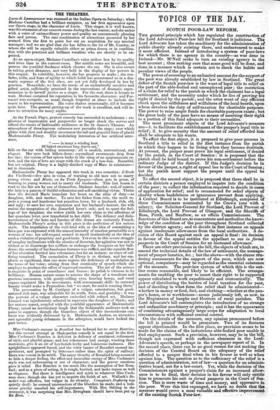At the French Plays, genteel comedy has succeeded to melodrama
: ex- plosions of imprecation and gunpowder no longer shock the nerves and offend the senses of fashionable audiences at the St. James's Theatre. An atmosphere of drawingroom calmness now pervades the stage; over which glides with slow and stealthy movement the tall and graceful form of placid Mademoiselle Plessy. The undulating intonation of her artificial utter- ance, " — in many a winding bout Of linked sweetness long drawn out," falls on the ear with lulling monotony: all is modish, conventional, and elegant. Her eyes look billets-doux; crystalized sweetmeats drop from her lips; the venom of her spleen lurks in the sting of an epigrammatic re- tort, and the ties of love are snapt with the crack of a bon-bon. Beautiful, but not original, Plessy is a highly-finished copy of Mars in miniature— set in diamonds.
Mademoiselle Plessy has appeared this week in two comedies: L'Ecole des Vieillards—five acts in verse, of warning to old men not to marry young wives; and Marie, ou lea Trois Epogues—three acts in prose, of warning to young women not to marry old husbands. This last lesson is read to the fair sex by one of themselves, Madame Ancelot; and, of course, the lady is a pattern of dutiful submission and self-sacrificing virtue. Thrice does the devoted Marie immolate her heart on the altar of duty—as daughter, wife, and mother. To save her father from ruin, the maid re- jects a young and handsome but penniless lover, for a husband, rich, old, and ugly; to save her own reputation and her husband's honour, the wife resists the temptation of the discarded lover's snit; and to spare the feel- ings of her daughter, the widow yields her own claim to the affections of her quondam lover, now transferred to her child. The delicacy and disin- terestedness of the hero and heroine of this drama are eminently French. Mademoiselle Plessy's acting in this piece is the perfection of her serious style. The trepidation of the well-bred wife at the idea of committing a faux-pas was expressed with the utmost intensity of emotion permissible to a woman of ton: her self-respect seemed to recoil instinctively at the idea of such a violation of propriety and good taste. Yet even in this severe struggle of naughty inclinations with the niceties of decorum, her agitation was not so violent as to disarrange her coiffure or endanger the bouquets on her ball- dress: the serenity of her handsome features was ruffled, and the equable flow of her elocution hurried into vehemence, but for an instant; no trace of suf- fering remained. The enunciation of Plessy is so distinct, and her em- phasis so significant, that one more regrets the deficiency of modulation in the tones of her voice; arising from that continuity of speech which she employs to produce the effect of repressed emotion. The art of the actress is exquisite in point of smoothness and finesse: its polish is vitreous in its brilliancy. Human nature seems to assume the shape of a wondrous and gracious automaton, with gently-rolling eyes, heaving bosom, and vocal organs regulated like its movements, with consummate skill: its outward beauty would make a Pygmalion; but " we start, for soul is wanting there."
The personation by M. Cartigny of a vulgar, ostentatious, but good- natured rich man, was admirable for its truth, force, and geniality: it was the portrait of a vulgar character embodied with refined art. Madame Lienard was injudiciously selected to represent the daughter of Marie; and her mature aspect, coupled with the youthful appearance of Mademoiselle Plessy, raised an involuntary laugh that the fashionable audience took no pains to suppress, though the blameless object of this inconsiderate out- burst was evidently distressed by it. Mademoiselle Andrea, an attractive and agreeable young debutante in the afterpiece, would have looked the part better.


























 Previous page
Previous page